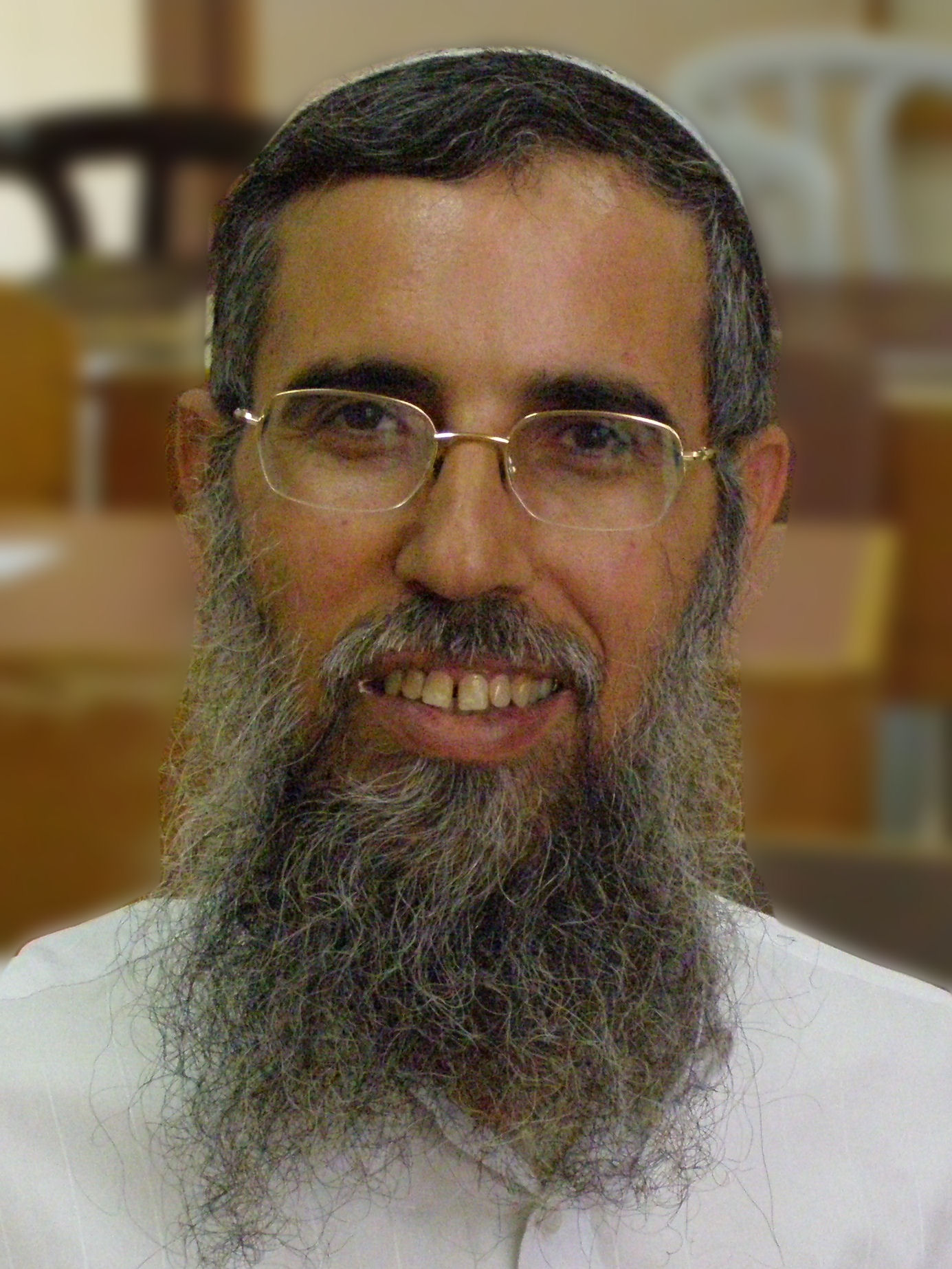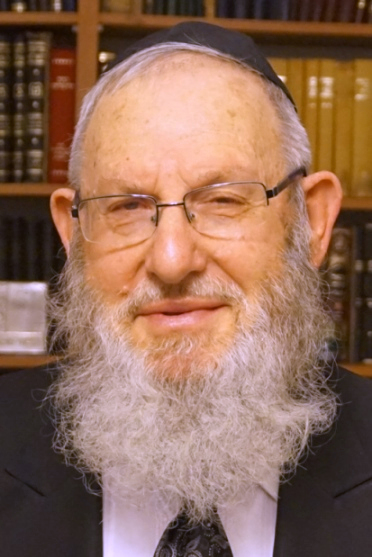The Will of Him Who Rested upon the Thornbush
By: Rav Mordechai Greenberg
Nasi Hayeshiva
(Written by Moshe Kahn and translated by R. Avi Ch Based on a Sicha given at the Memorial Gathering for Rav Goldvicht zt"l
During the annual gathering commemorating Rav Goldvicht zt"l we traditionally discuss an aspect of the death of Moshe Rabeinu, which also falls on the seventh day of Adar. This year we will continue in this tradition.
When Moshe blesses the twelve tribes before his death, he says to Yosef, "Blessed by Hashem is his land ... with the bounty of the land and its fullness, and by the will of Him Who rested upon the thornbush ("sneh")." (Devarim 33:13-16) Rashi explains that Moshe said, "[Yosef] should be blessed by the will and favor of Hashem who first appeared to me in a thornbush."
This term for Hashem, "Him Who rested upon the thornbush," requires explanation. There are many general terms through which Hashem is referred to, such as "Kel Elyon" (Bereishit 14:20) or "[He] Who brought you up from the land of Egypt." (Devarim 20:1) But why is Hashem here described based on a particular incident, His appearance in the burning thornbush? Furthermore, what is the connection between the "will" of Hashem and the thornbush?
The Maharal, in Gur Aryeh, explains: Since Hashem appeared to Moshe in the thornbush, hinting to the fact that, "Imo anochi betzara - I am with him in distress" (Tehillim 91:15), there is no greater expression of His will. This enigmatic statement of the Maharal requires explanation.
Based on the parshiot of these weeks, Teruma and Tetzaveh, we will be able to provide some insight. Chazal say that Hashem "desired to have a dwelling place in the lower realms." Therefore, He commanded in the beginning of Parshat Teruma, "They shall make a Sanctuary for Me - so that I may dwell among them." (Shemot 25:8) The word "desired" expresses a strong will, further evidenced by the teaching of Chazal that Hashem created the world on condition that Bnei Yisrael accept the Torah. Had they not accepted it, Hashem would have returned the world to "tohu vavohu - total emptiness." When they did accept the Torah, the creation of the world was finalized and affirmed. This desire to dwell in this world is one will of G-d.
In addition, Hashem desired that this dwelling should be accomplished through Yisrael. The Midrash comments in the beginning of Parshat Tetzaveh (Shemot Rabbah 36:4):
This is what is said, "Cherish Your handiwork!" (Iyov 14:15) In four ways Hashem desired the work of his hands ... Hashem carries the world, yet he commanded the descendants of Kehat to carry Him [the Aron] ... Hashem guards his world, yet he told Israel to guard Him [the Mishkan] ... He provides light to the world, yet he said to Israel, "They shall take for you pure, pressed olive oil [for illumination]." This is [an expression of], "Cherish your handiwork!" Hashem has two desires: a desire to have a dwelling place in this world, and that we, Klal Yisrael, should make this dwelling place.
Conversely, we find in the Midrash Eichah (Petichta 24) that Hashem personally cries over the destruction of the Temple, and says, "Woe is to Me! What did I do! I dwelt My Presence below on account of Israel, and now that they sinned, I returned to My first place!" If the destruction of the Beit Hamikdash disturbs Hashem so much, why did He destroy it? And why doesn't He rebuild it? The answer is that Hashem wants us to take initiative -- "Cherish Your handiwork!" He wants us to take action to rebuild the Beit Hamikdash.
This relationship between Israel and Hashem is expressed poignantly in the Midrash on the pasuk in Shir Hashirim (3:11), "Go forth and gaze, O daughters of Zion, upon King Shlomo, with the crown with which his mother crowned him" (Shir Hashirim Rabbah 3:21):
[This can be compared] to a king who had a beloved daughter, whom he loved dearly and called her, "my daughter." He continued to love her until he called her, "my sister." He continued to love her until he called her, "my mother." So too, Hashem loved Yisrael dearly, and called them, "my daughter," as it says, "Listen daughter and see." He continued to love them until he called them, "my sister," as it says, "Open to Me, My sister, my love." He continued to love them until he called them, "my mother," as it says, "My people ("leumi"); give ear to Me." (Yeshaya 51:4) "Le'imi" is written [without a vav, which can be read as "my mother"]. We can explain this Midrash in the following manner. Everything is this world works in a manner of cause and effect, until G-d, the Ultimate Cause, as the Rambam defines. The Maharal explains that the cause and effect relationship is most noticeable in regard to Israel. Initially, Hashem is the Creator of the world and the reason for existence of Klal Yisrael, just as a father is the reason for the existence of his daughter. On this level, Hashem calls Klal Yisrael, "my daughter." There is another level in which Hashem is a partner of Klal Yisrael, and He therefore calls us, "sister," which implies a mutual relationship.
A third level is that of, "Cherish Your handiwork!" Hashem, as if, depends on us and we, as if, are the cause for Him. The Ramban hints to this in Parshat Teruma, on the pasuk, "They shall know that I am Hashem, their G-d, Who took them out of the land of Egypt to rest My Presence among them." (Shemot 29:46) He writes:
On a simple level, Hashem dwells among Yisrael for their benefit, not for His. However there is an aspect of Hashem's presence in Yisrael which fulfills the pasuk, "Yisrael, in whom I take glory." (Yeshaya 49:3) This is what was meant when Yehoshua said (7:9), "What will You do for Your Great Name?" If Hashem were to allow Yisrael to be destroyed, Hashem, as if, would not be in this world. On this level, Yisrael is called by Hashem, "my mother."
There were two revelations at Chorev. The giving of the Torah expressed Hashem's desire for a dwelling place for in this world. The revelation in the burning thornbush comes to underscore the unique link with Yisrael. What would happen if Yisrael dropped to such a low level that they would not be able to fulfill their mission in this world? Would Hashem replace them with another nation? The revelation at the burning bush shows that "Imo anochi b'tzara - I am with him in distress," and exemplifies the complete dependence of Hashem on Israel. Hashem will not replace Yisrael with another nation, and if they are incapable of fulfilling this mission, Hashem descends to their place of lowliness, as expressed by the thornbush.
"I shall descend with you to Egypt." (Bereishit 46:4) This is the greatest promise, that He will never publicize His honor in this world, other than through the salvation of Israel. (Beit Halevi) So long as they are lowly, "Imo anochi b'tzara." Chazal compare this relationship of Hashem and Yisrael expressed by the thornbush to that of twins. (Cf. Shir Hashirim 5:2) Just as when one of the twins is in pain the other also feels it, so too, Hashem feels Yisrael's pain.
Similarly, the Ramban writes in Parshat Ha'azinu (32:26) that if Yisrael would cease to exist, the entire purpose of the creation would not be fulfilled. Therefore, included in Hashem's desire in the creation of the world is that Am Yisrael should be His nation forever. This is Hashem's great promise to Yisrael, and this is the understanding of the Maharal that was quoted above, "There is no greater expression of His will." Hashem desired that his creations, specifically Yisrael, would provide him with a dwelling place in this world.
Generally, the significance of Yisrael is understood as participating in the continuation of the creation. Moshe, however, in breaking the Tablets, introduced a new concept. It is possible to reveal and increase the Glory of G-d not only through building, but even through breaking. Rav Kook writes in Orot Hakodesh (Vol. II, p. 314):
There is kedusha (sanctity) that builds and kedusha that destroys. Everyone sees the kedusha that builds ... but the kedusha that destroys is hidden. Its benefit is hidden; it destroys in order to build something greater than that which was previously built. One who is able to comprehend the kedusha which destroys - according to the degree of his perception is the degree of his "tikkun" (improvement). From the kedusha that destroys comes great people who bring blessing to the world. This is the level of Moshe who destroyed the "luchot" (Tablets). Moshe, by destroying the luchot, helped elevate Torah. Maran Rosh Hayeshiva zt"l countless times discussed the famous Beit Halevi that through the breaking of the luchot, the Torah Shebe'al Peh was formed. Regarding the breaking of the luchot, Hashem said, "Yishar kochacha sheshibarta - Congratulations for breaking." However, no one heard Hashem say this to Moshe. When did this dialogue become publicized?
We can answer based on the Mishna in Avot (5:23), which discusses the differences between the students of Bilaam Harasha and the students of Avraham Avinu. The commentaries ask, why does the Mishna discuss their respective students, and not the differences between Bilaam and Avraham themselves? The answer is that it is difficult to judge an ideology based on its founder. Bilaam himself can be a great prophet, perhaps even on the level of Moshe. An ideology can only be judged based on its students and followers. The breaking of the luchot was only understood on Moshe's last day in the world, when he initiated Yehoshua, the father of Torah Shebe'al Peh, as leader of Klal Yisrael. Therefore, the last Rashi in the Torah says that Hashem congratulated Moshe on breaking the luchot.
The Rosh Hayeshiva zt"l was not afraid to forge his own path. Many of his colleagues and Rabanim did not view his actions favorably. On his last Motzei Shabbat in this world he told me about his dilemmas that the Yeshiva that he established looked like a broken piece compared to the traditional yeshivot. However, today we see that there are hardly any Yeshivot without Kerem B'Yavneh alumni on their staff. On this seventh day of Adar we completed a Sefer Torah which will serve as a remembrance of the Rosh Hayeshiva zt"l, and concluded the verse, "by all the strong hand..." We, his students and followers, can openly say, "Yishar kochacha sheshibarta."
Shiur ID: 4058
Do you have a comment or question on the shiur?
Comment below and we'll join the discussion
Add your comments:

.jpg)




.jpg)